UNPLUGGED ACTIVITIES
Dear Families, there are lots of activities you can do together that are low tech, or no tech, but still help your children understand more about how computers and programmers work and think.
I'll be posting a new one here each week.

Getting Loopy from code.org: In the world of coding,a loop is “the action of doing something over and over again.” But loops can be used to describe things other than coding. Take a look at the directions for the moves below:
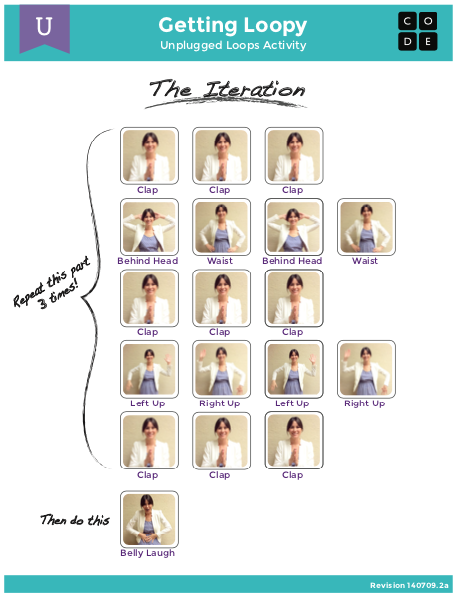
In the second diagram, you can see that the top line is simplified. Can the other lines be simplified, too? How would you do it? Can you make up your own moves and “code” the steps by showing which ones need to repeat, or loop? See how simple you can go!
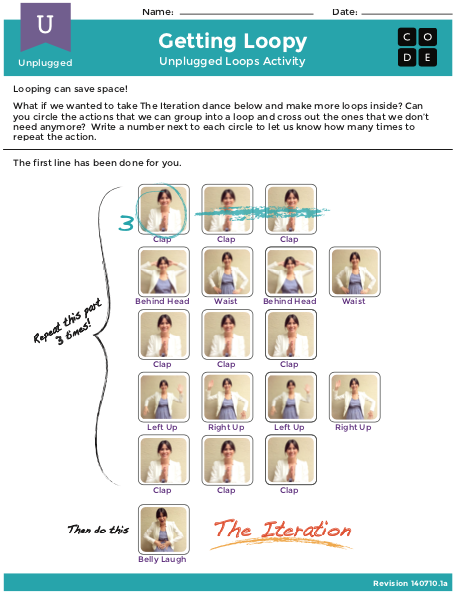
Why are loops important to computer programs and programmers? When loops are used, directions can be shorter. And if the directions are shorter, there’s less chance that any errors will be made. If you need to write or describe directions, loops can help you, too. The powerful key word is REPEAT.
Ask your Third and Fourth graders when they've used a Repeat command in computer class!
Creativity: what is it, and why is it so important? What are some things we couldn’t enjoy, without it? Here are a few short videos from CODE.org, defining creativity in many different ways (that’s creative!). What do you and your family think it is? What creative things do you do? What else could you be doing?
https://safeYouTube.net/w/gtiH
https://safeYouTube.net/w/TuiH
https://safeYouTube.net/w/yviH
https://safeYouTube.net/w/gwiH
Week of May 18: Robot Challenge: imagine, draw or build your own robots. Then talk about what your robot’s super power might be. Does your robot have any not-so-super powers? (Like procrastinating or forgetting things?) How would you give your robot directions? What jobs might it be good at? (Setting the table or walking the dog?) How would your family of robots get along? What would they do for fun? Keep asking questions - keep imagining the possibilities!
Week of May 11: Teamwork: watch this video, then you and your family can think and talk about why teamwork is important in all sorts of settings: designing games, playing games, doing things around the house...
Week of May 4:watch this video, then you and your family can play around with If, Then statements. Great way to fill a while-we’re-waiting moment. You give the If part, kiddos give the Then. Or, switch it up. Are your Then statements logical? Computers love logic!
Older students may remember my If statements posted outside the old computer lab, which they could think about, and then complete.
Week of April 27:
We take digital pictures easily, and often. But do your kids know that digital pictures are composed of squares, or pixels, of color? This hamster pic shows them well, but all digital pictures use the same building blocks.
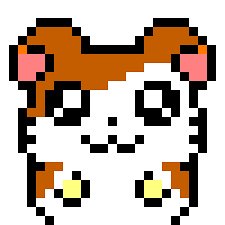
And speaking of blocks, here's a map of Africa using Lego stud pieces, for a similar effect:
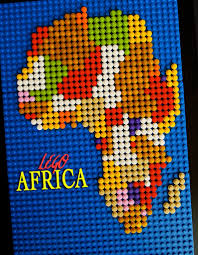
Open the Unplugged Activities folder to find printable pages for simple or symmetrical (for those that want a challenge!) puzzles. It's not just color-by-number when you understand what pixels are!
Look at some pictures you may have on your phone. Can you zoom in enough to detect any pixels?
Why or why not? If not, is that a good thing?
Week of April 13:
Trouble Shooting or Debugging are important skills for coders - and all of us! Tell your child a story about a time you solved a problem. Was it frustrating? What did you need to solve the problem, or to get help? Was your first idea your best idea? Did you stick with it til the problem was solved?
Perseverance is an important skill, too.
I bet your child can tell you about a time they were a Troubleshooter, too ~ it’s something to celebrate!
Week of April 6:
Puzzling Times: Have any puzzles hanging around? I’m thankful we have a couple at our house! They’re a great diversion, because you’re not just piecing, you’re practicing the four steps of computational thinking (and no computer needed!)
If you look for edge pieces first, you’re breaking a big task into smaller parts.
When you look for all those green pieces, you’re using the power of patterns.
See that squirrel running by outside? Or a puzzle piece that you don’t know what to do with, yet? Try not to get distracted! Staying focused on your task is part of computational thinking.
Do you have an overall strategy? First the edges, then working down from the top, or in a corner? Using that plan, seeing how it works and making any changes is the final step. Activities like this can help all of us to become better thinkers and problem solvers.
No puzzles? Look for games that may require these skills - or try to make up your own.
Week of March 30:
Can cooking be like coding? I know that if I don’t follow directions from a recipe, bad things happen. As a family, find a recipe to follow (cookies are my favorite!). Talk about what you need to do first, second, third and so on. What would happen if you did things in a different order? Or skipped something altogether? Would your results be good? Or a kitchen disaster?
Week of March 23:
Computers can follow directions in the order you give them.
How good are we at sequencing things? Here are some pictures you can put in order (or decide you don’t need at all) to show the steps of planting a seed. You don’t need to print ~ just discuss!
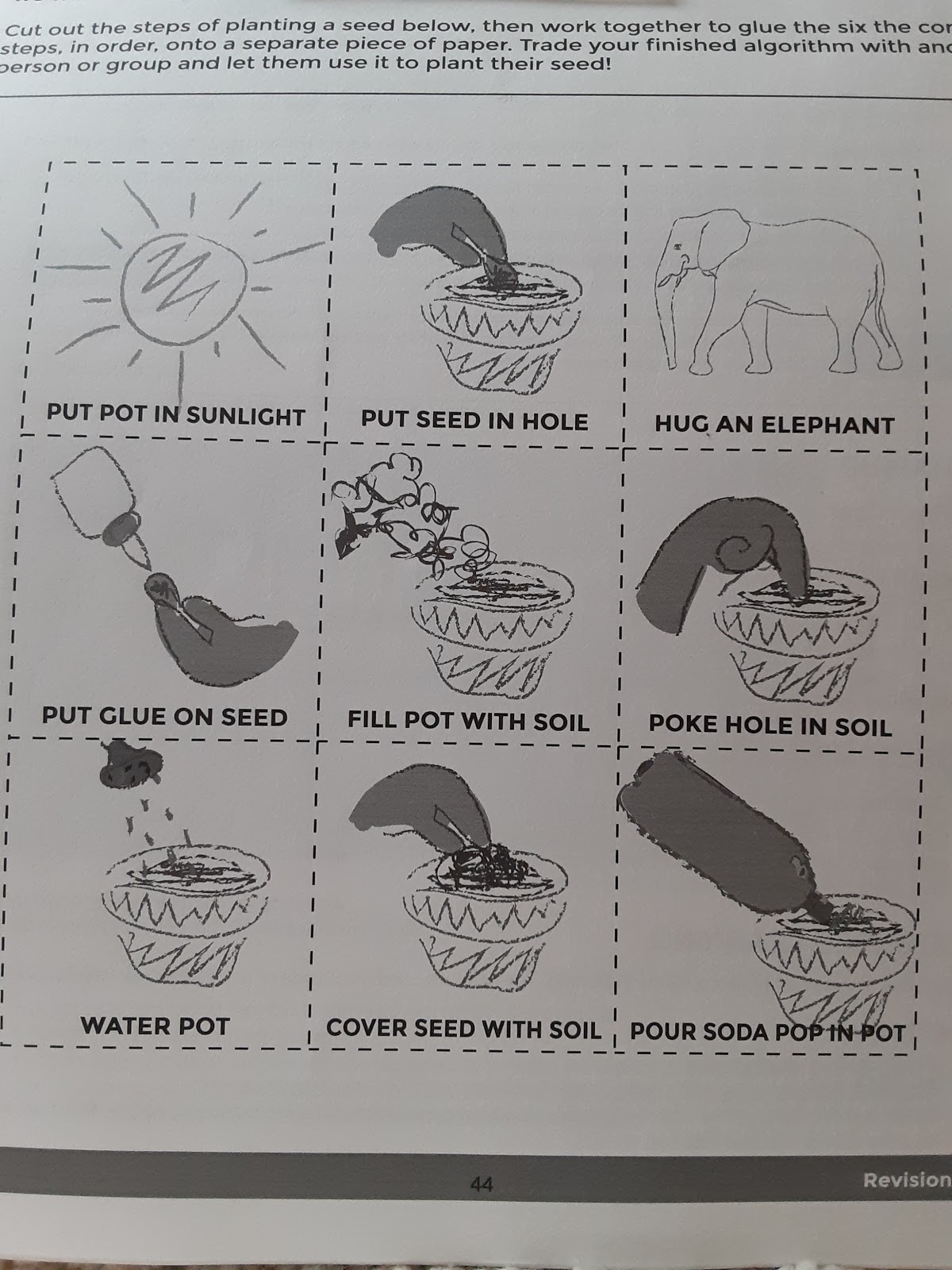
Want to do more? Do you have cartoon strips that can be cut apart and re-sequenced? If not, draw your own pictures to tell a story and see how someone else puts them in a logical order.
Week of March 16:
Can you follow directions as well as a computer can? You need a partner, and each of you needs the same materials (Legos, pencil/paper, maybe even spoons ~ get creative!). Now sit back-to-back. Take turns giving (and following) directions as you build, draw, create patterns. Can the listener/computer create the same thing as the talker/programmer? Do you know what to do first, and next and next? And don’t forget to wash the spoons when you’re done!
